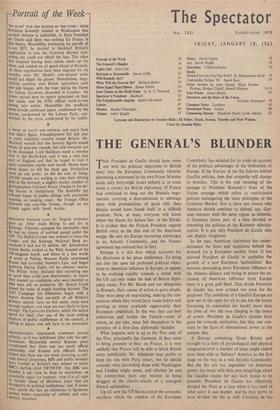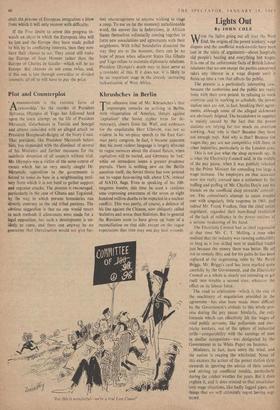THE GENERAL'S BLUNDER
THAT President de Gaulle should have come out with his political objections to British entry into the European Community (thereby disowning a statement by his own Prime Minister made only forty-eight hours before) is, in some sense,, a victory for British diplomacy. If France had continued to drag out the Brussels nego- tiations, covering a determination to sabotage them with protestations of good will, then Britain would have found itself in a difficult position. Now, at least, everyone will know where the blame for failure lies: in the Elysde. It is evident that the French President regards British entry as the thin end of the American wedge. He sees his Europe becoming submerged in an. Atlantic Community, and the Nassau agreement has reduced him to fury.
Perhaps it is this fury which accounts for his directness at his press conference. To bring out into the open his profound political objec- tions to American influence in Europe, to appear to be evolving rapidly towards a break with the US can only make the task of British diplo- mAcy easier. For Mr. Heath and our delegation in Brussels, their course of action is quite simple. They must keep on negotiating, making the con- cessions which they would have made before and proving at every available opportunity their European credentials. In this way they can best embarrass and isolate the French—some of whom, at any rate, must feel themselves in the presence of a first-class diplomatic blunder.
What happens next is up to the Five and, of the Five, principally the Germans. If they unite to bring pressure to bear on France, it is very unlikely that France will be able to block British entry indefinitely. Dr. Adenatier may prefer to keep his ties with Paris intact, but he should consider what discarding those with Washington and London might mean, and whether he and his countrymen have any interest in being dragged at the chariot-wheels of a resurgent ' French nationalism.
Up till now the US has accepted the economic sacrifices which the creation of the European Commtinity has entailed for its trade on account of the political advantages of the unification of Europe. If the Europe of the Six follows behind Gaullist policies, then that sympathy will change to hostility. This is the real meaning of the passage in President Kennedy's State of the Union message which refers to restrictionist policies endangering the basic principles of the Common Market. Nor is there any reason why America should continue to defend, say, Ger- man interests with the same vigour as hitherto, if Germany forms part of a bloc devoted to thwarting the policies of the Kennedy adminis- tration. It is not only President de Gaulle who can display toughness.
In the past, American diplomacy has under- estimated the fears and suspicions behind the demand for a European nuclear force. It has allowed President de Gaulle to capitalise the growth of a new European 'nationalism.' But between demanding more European influence in the Atlantic alliance and trying to secure the ex- clusion of American influence from Europe there is a great gulf fixed. That divide President de Gaulle has now crossed too soon for his purposes. The ambitions of a Gaullist Europe are now out in the open for all to see, but the forces favouring its realiSation are hardly more than the lives of two old men clinging to the levers of power. President de Gaulle's dreams have gone far towards realisation, but they run con- trary to the facts of international power at the present day.
A Europe containing Great Britain and brought to a state of psychological and physical integration over a number of years might indeed. have been able to 'balance' America as the first stage on the way to a real Atlantic Community. But the Six are too dependent on American power, too beset with their own misgivings about the Gaullist course for any such stance to be possible. President de Gaulle has effectively divided the West at a time when it has need of what unity it can muster, and he may prove to have divided the Six as well. Certainly he has dealt the process of European integration a blow from which it will only recover with difficulty.
If the Five desire to arrest this progress to- wards an abyss in which the European idea will be lost and the Europe they have made pulled to bits by its conflicting interests, then they now have their chance to act. They could still make the Europe of Sean Monnet rather than the Europe of Charles de Gaulle—which will be no Europe. But chances do not come twice, and, if this one is lost through cowardice or divided counsels, all of us will have to pay the price.































 Previous page
Previous page